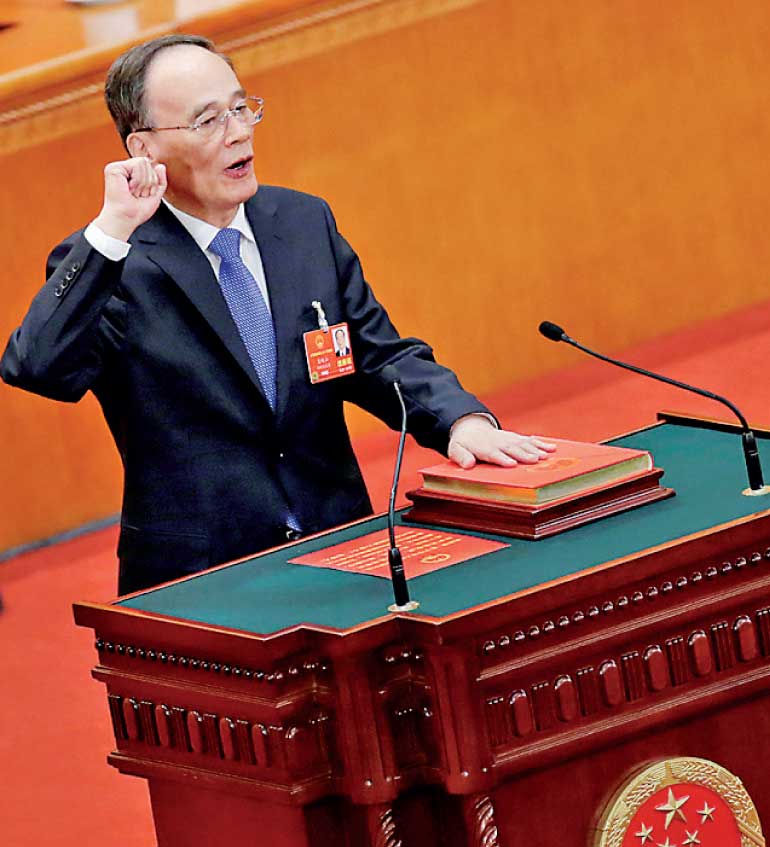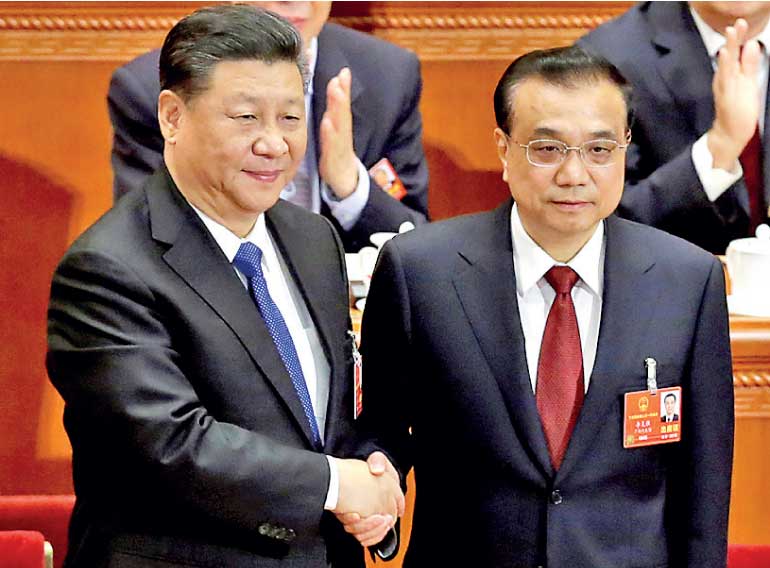Saturday Feb 21, 2026
Saturday Feb 21, 2026
Monday, 19 March 2018 02:05 - - {{hitsCtrl.values.hits}}

Newly elected Chinese Vice President Wang Qishan with his hand on the Constitution takes the oath at the fifth plenary session of the National People’s Congress (NPC) at the Great Hall of the People in Beijing, China March 17, 2018. REUTERS
Beijing (Reuters): China’s largely rubber-stamp parliament chose former top graft-buster Wang Qishan, a key ally of President Xi Jinping, as vice president on Saturday, a widely expected move that nonetheless breaks with convention and underlines Xi’s dominant authority.
Xi was also re-elected president by parliament, with no votes cast against him. The body is packed with party loyalists and there was no chance he would not win the vote.
Wang bowed twice and then walked over to Xi to shake his hand after the vote was announced inside Beijing’s Great Hall of the People. Only one person voted against Wang out of the 2,970 votes cast.
Xi and Wang spoke only to pledge allegiance to the constitution, with Wang giving the podium an emphatic tap after he finished.
Known as “the firefighter” for his central role in tackling issues like corruption and domestic financial problems over the years, Wang also has experience dealing with the United States in his former role as a vice premier who led annual economic talks with Washington.
He was a major player in Xi’s battle against corruption, with dozens of senior officials jailed during his tenure as the top graft-fighter, including the fearsome domestic security chief Zhou Yongkang, now serving life in jail.
Zhao Wanping, a delegate from the central province of Anhui, told Reuters Wang’s election was in line with the will of the people, pointing to his anti-corruption efforts.
“Our country needs someone like him who will continue to step out and shoulder responsibilities for the people,” he said.
Last Sunday, parliament voted to amend the constitution, which removed presidential and vice-presidential term limits, meaning Xi can stay in power indefinitely, a move the government has presented as widely welcomed despite criticism that has evaded the censors and seeped onto Chinese social media.
The party’s People’s Daily hailed Xi’s unanimous re-election in an editorial on its WeChat account, using language once more associated with Mao Zedong to say he was a “leader loved and respected by the people” and the “helmsman of the country”.
Wang’s appointment has the potential to reshape what has traditionally been a ceremonial role. China’s relationship with the United States is likely to be a key part of his remit, according to diplomats and sources with ties to the leadership.
China has been trying to head off a trade war with the United States, sending envoys to Washington in recent weeks, including Xi’s top economic adviser, Liu He.
US President Donald Trump is seeking to impose tariffs on up to $60 billion of Chinese imports and will target the technology and telecommunications sectors, two people who had discussed the issue with the Trump administration said this week.
In January, Wang, who turns 70 in July, was named a parliament delegate with the central province of Hunan despite having stepped down from the elite seven-man Politburo Standing Committee during a five-yearly leadership transition in October.
Despite holding no official senior party role, Wang has taken centre stage at plenary sessions this parliament, seated immediately next to the seven members of the Standing Committee, in a clear indication of his actual status.
At the opening session where Premier Li Keqiang presented the government’s work report, Wang cut a relaxed figure, staring straight ahead impassively while other delegates busily read and jotted down notes.
Protocol at major political events, including seating arrangements and the order in which leaders are shown in state news bulletins, are tightly choreographed to convey a political message.
Wang cast his ballot on Saturday immediately after Han Zheng, the seventh-ranked and most junior Standing Committee member, drawing enthusiastic applause from the other delegates.
Wang has otherwise kept a relatively low profile at parliament so far, with no state media reports of any visits to other provincial delegations to rally legislators, as members of the Standing Committee have done, including Xi.

Chinese Premier Li Keqiang (R) shakes hands with Chinese President Xi Jinping, after he is voted as the premier for another term, at the sixth plenary session of the National People’s Congress (NPC) at the Great Hall of the People in Beijing, China March 18, 2018. REUTERS
Beijing (Reuters): With pictures of ecstatic citizens standing in applause, happily tearful legislators and even a social media game, China’s propaganda drive has kicked into high gear following Xi Jinping’s unanimous reappointment as president.
Xi’s face dominated the front pages of major Sunday newspapers, many carrying the same editorial from the ruling Communist Party’s official People’s Daily using language once more associated with Mao Zedong to say he was a “leader loved and respected by the people” and “helmsman of the country”.
“The voyage of a great country cannot do without a helmsman,” the paper wrote.
The military’s official People’s Liberation Army Daily pledged its loyalty to Xi in its editorial, saying his election would ensure the country’s long-term peace and stability. Xi is also head of the armed forces, the world’s largest.
There was never any doubt that the largely rubber-stamp parliament would not have re-elected Xi as president on Saturday, especially following a constitutional amendment a week earlier which lifts presidential term limits, meaning Xi can stay on indefinitely.
While the amendment was passed with just six dissenters - two no votes, three abstentions and one invalidated ballot - none of the roughly 3,000 legislators voted against Xi, a point made repeatedly in state media coverage.
State television showed images from the floor in the Great Hall of the People of some legislators in tears after Xi swore an oath to the constitution following his re-election, a vote it described as a “solemn and sacred historic moment”.
In a moment of high political theatre, a copy of the constitution was carried onto the main stage by three members of the armed forces.
Other pictures on state media showed ordinary people standing in applause in front of television screens around the country at Xi’s re-appointment.
The government has presented this month’s parliament session and its controversial removal of presidential term limits as widely welcomed despite criticism that has evaded the censors and seeped onto Chinese social media at times.
Social media accounts of state media have leapt into action to offer their support, even as the comments sections have either been disabled or only show supportive remarks from users.
Late on Saturday, the People’s Daily WeChat account went live with a game where players have 20 seconds to press the screen as many times as they can to register a “like” for all the government’s achievements of the past five years, Xi’s first term in office.
The top-rated comment on Sunday morning was one user proudly saying he had pressed “like” 181 times.
“Press like for Uncle Xi!” wrote another user, using a popular term of endearment for Xi.